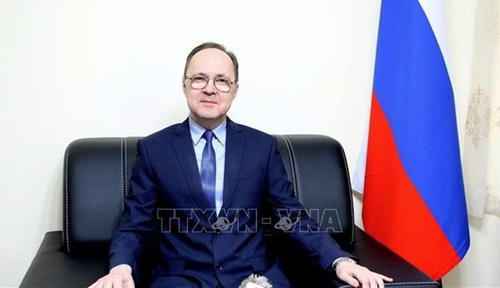Ambassador Bezdetko called it a key event in this year's highest-level bilateral engagement program. The visit coincides with significant anniversaries, including 75 years of diplomatic relations between the two countries, 80 years of the Great Patriotic War victory of Russia, and 50 years since Vietnam's liberation of the South and national reunification, he noted.
The ambassador noted that the presence of Vietnam’s top Party leader at the commemorative events in Moscow serves as a testament to the shared perspectives between the Russia and Vietnam on current global developments, the historical outcomes of the Second World War, and the importance of safeguarding historical truth against politically motivated distortions.
    |
 |
|
Russian Ambassador to Vietnam G. S. Bezdetko |
He expressed his hope that during the visit, the two countries’ leaders will engage in in-depth discussions on the full range of issues on the bilateral agenda, focusing on advancing substantive cooperation and resolving outstanding matters. Preparations for the planned meetings and negotiations are already well underway, he said, hoping that the outcomes will include substantive agreements to further consolidate the comprehensive strategic partnership between Russia and Vietnam in key areas.
Expressing confidence in the success of the visit, he remarked that all the necessary preconditions have been in place to ensure a productive outcome. He voiced his hope that the two sides will reach concrete agreements to deepen economic and trade relations, including the implementation of large-scale joint projects in potential sectors.
Pointing to ongoing shifts in the global geopolitical landscape, the ambassador emphasized the importance of preserving and strengthening ties with long-standing, traditional partners, including that shared by Russia and Vietnam.
Reflecting on 75 years of relations, Ambassador Bezdetko highlighted the strong foundation built during Vietnam’s struggle for national independence and reaffirmed that this relationship remains unshaken by global changes.
He said Russia regards Vietnam not only as a close partner but also as a gateway to Southeast Asia. The Free Trade Agreement between Vietnam and the Eurasian Economic Union (EAEU) plays a vital role in enhancing bilateral trade and investment.
The ambassador affirmed Russia’s support for enhancing cooperation among the EAEU, the Association of Southeast Asian Nations (ASEAN), the Shanghai Cooperation Organization (SCO), and other multilateral frameworks operating across the wider Asia-Eurasia region.
Among the core pillars of the Russia-Vietnam comprehensive strategic partnership, energy cooperation remains a cornerstone. For over four decades, the Vietsovpetro joint venture has played a central role in the bilateral oil and gas sector. Russian energy giant Gazprom, a global leader in natural gas production, is also actively involved in projects in Vietnam.
The ambassador welcomed expanding cooperation in high-tech industrial production, citing notable examples such as the Russian-branded GAZ automobile assembly facility in Da Nang and the joint Russia-Vietnam Tropical Center, which conducts pioneering research in medicine, ecology, and materials science.
Scientific, educational, and technological cooperation between the two countries has become a longstanding tradition. The ambassador highlighted the effectiveness of Russia’s federally funded scholarship program for Vietnamese students at Russian universities. He also mentioned an ongoing project to establish the first Russian-language school in Hanoi.
People-to-people links continue to underpin bilateral ties, with Vietnamese speakers of Russian and Russian speakers of Vietnamese acting as vital bridges between the two societies. The ambassador noted the strong cultural affinity between the two nations, with Russian culture enjoying wide popularity in Vietnam, while original forms of Vietnamese art remain appreciated in Russia.
The ambassador highlighted that direct people-to-people connection remains a driver of humanistic engagement. He noted that the resumption of direct flights between Russia and Vietnam has significantly boosted tourism. In 2024 alone, approximately 232,000 Russian tourists visited Vietnam, an increase of nearly 85% compared to the previous year, while the number of Vietnamese visitors to Russia is also steadily rising.
He also acknowledged the role of Russian localities in deepening bilateral ties through strong partnerships with Vietnamese cities and provinces. Regions such as Saint Petersburg, Tatarstan, Kaluga, and Ulyanovsk have been particularly active in fostering these connections.
Overall, the ambassador said, Russia and Vietnam possess all the necessary conditions to further expand their equitable and mutually beneficial partnership. Looking ahead with optimism, he reaffirmed Russia’s commitment to working closely with Vietnam to unlock the untapped potential of their comprehensive strategic partnership, for the benefit of both peoples, and in the interest of peace and prosperity.
During his stay in Russia, General Secretary To Lam will attend the commemoration of the 80th anniversary of the Great Patriotic War victory in Moscow.
Regarding the significance of the event, Ambassador Bezdetko underscored that the lesson of the Great Patriotic War affirms that global peace and comprehensive development can only be guaranteed based on respecting the aspirations of each nation and the right of countries to pursue independent and sovereign policies rooted in traditional values. This is especially crucial in today’s geopolitical context, where the world faces unprecedented challenges and threats, and international relations are undergoing a fundamental restructuring as a new world order takes shape.
In this context, Russia emphasizes its support for a multipolar world order, advocating for the principle of equal sovereignty of nations and ensuring a balance of interests. This is the only way to ensure fairness in international relations. This system's international legal significance requires no adjustments, rather, the United Nations Charter must be fully and entirely implemented, not selectively, stated the diplomat.
Source: VNA